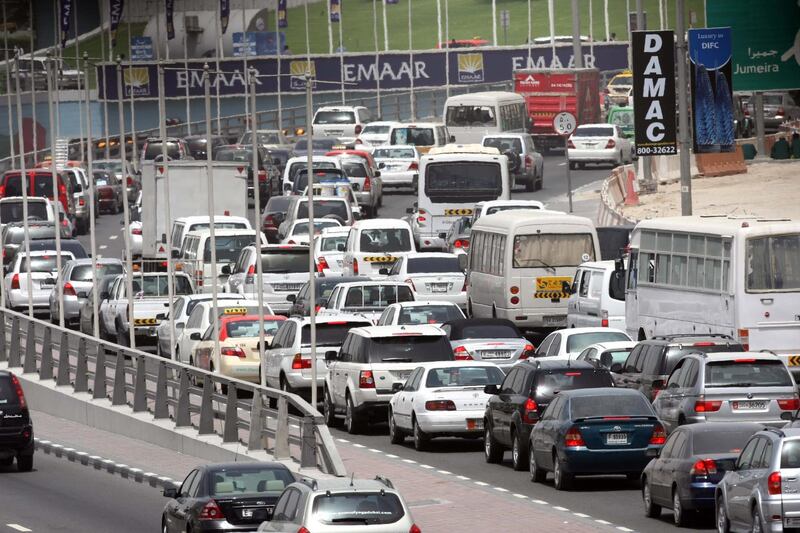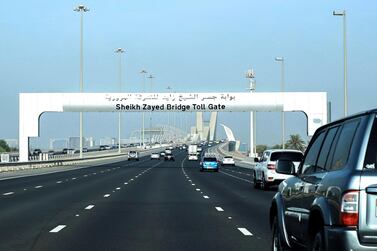Intelligent roads and pre-emptive traffic warning systems could help reduce pollution and cut congestion in choked-up cities such as Dubai in the near future.
At a conference in Dubai, experts described how a digital model of the emirate using traffic data at peak times can predict congestion hotspots and help drivers steer clear of a gridlock.
That information can then be used to improve vehicle flow through speed restrictions, alternative routes and providing route information ahead of potential jams.
Specialists from the PTV Group, an international software company that has helped reduce traffic in 18 countries, presented their latest technology to decrease tailbacks and fumes during rush hour.
Named among in the top 50 global pollution hotspots by Greenpeace, Dubai is a modern city that would benefit from a reduction in congestion and carbon-dioxide emissions.
“In Dubai there is one big vehicle pipeline from Sharjah that gets congested at specific times of the day,” said Andrea Petti, regional managing director for PTV Group.
“It is about understanding where congestion is so it can be better managed.”
PTV builds digital models of a city to gather data and make projections, so authorities can understand where will be a traffic build-up and when.
“This helps them address traffic congestion and encourages people to use more efficient public transport systems like the Metro,” said Mr Petti.
“Changing human behaviour and better utilising existing infrastructure will help reduce emissions in cities like Dubai.”
While the dream of self-driving electric cars may be a decade away, dramatic change is forecast in the way residents will navigate Dubai in the near future.
Along with an integrated traffic management system, changing human behaviour in a city where the car is king could be the greatest challenge to reduce harmful vehicle emissions.
Ride sharing and improved "last mile" transport via electric scooters to and from a wider public transport network are important factors to take cars off the road.
“One option is to use autonomous shuttles, where there is a mix of both electric mobility and a high-capacity transport system that can offload passengers on their routes,” said Mr Petti.
“Convenience is a must for travellers, so first and last mile options like e-scooters will ease Metro accessibility.
“There will always be hardcore populations that will not move to public transport, so it has to be made an attractive proposition.”
Cities around the world are already using various methods to reduce congestion and pollution.
The Moia ride-sharing service trialled by Volkswagen in Hamburg and Hannover in Germany was launched two years ago.
More than 300 luxury mini-vans are run, carrying up to six passengers at a time in comfort, allowing them to relax or work during their journey.
Moia aims to take a million cars off the roads and estimates it can reduce congestion by 90 per cent in the cities where it operates.
Abu Dhabi is leading efforts to reduce the number of vehicles on the roads by launching a carpooling initiative.
The Department of Transport launched an online system last week that encourages motorists to sign up and offer lifts to strangers, friends and work colleagues.
Those signing up to the new Uber and Careem-like platform can either look for rides or offer them, with the system relying on Good Samaritans who are keen to help cut carbon emissions.
As well as the mental toll of being stuck in traffic, gridlock can have an ill effect on health. Airborne nitrogen dioxide particles emitted by vehicles can cause respiratory damage, leading to lung infections and asthma.
According to the World Health Organisation, air pollution kills half a million people every year.
Taking vehicles off the road is a proven solution to also reducing killer smog.
Researchers have found success with similar traffic reducing methods used in Turin, Italy.
Since 2013, traffic management software developed by PTV has eased congestion, transforming Turin into one of the most free-flowing cities In Europe.
“With just a few sensors in the right places and the correct model you can develop short-term forecasts on traffic flow so it can be managed correctly,” said Dr Dario Menichetti regional project manager for PTV Group.
“Previously the approach has been more reactive, now it can be pre-emptive to reduce the impact of traffic scenarios.”
By machine learning and algorithms, the system spots where problems may arise and then develops a solution with traffic controllers and signals.
“In Turin, we have been able to manage accuracy of the system over time to see how it can be used elsewhere,” said Dr Menichetti.
“The city is now considered one of the most advanced for transportation. There are less stops at intersections, so there is less pollution.”








